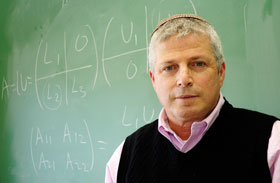  |
| HOME | THIS ISSUE | CALENDAR | GRANTS | BACK ISSUES | < BACK | NEXT > |
Ancient axioms and modern ingenuity combine in math professor’s worldby Scott Brinckerhoff - March 27, 2006 |
||||
|
Every workday, without fail, Professor Michael ‘Miki’ Neumann, head of the Department of Mathematics, pedals around his home or the UConn campus on his silver Raleigh, contemplating complex mathematical problems. Neumann operates in a world of linear algebra, matrix theory, and other high-end mathematics, developing algorithms that often expand the very science to which he has devoted much of his life. Like an engineer building a bridge on bedrock, he relies on axioms accepted since the time of Archimedes. With Neumann’s ingenuity, mathematical bridges built long ago are being extended to address modern problems. Last year he was named one of the University’s Research Fellows. One day recently, he explained to a visitor what numerical analysis – his primary research interest – is all about. Drawing an ameba-like shape on the board, he said, “This is the kind of thing that numerical analysis deals with – approximating the area of any irregular shape. It is very difficult to find the area, but it has an area. You can see that.” To find it, he said, “You develop an algorithm based in part on calculus. You divide the area into very, very thin strips and join their ends at the boundary to create a number of small trapezoids. " We know how to find the area of a trapezoid, so our formula adds them all together and we end up with a very good approximation of the total area.” His specialty has application in all sorts of chance problems, ranging from predicting the when the weather might change to understanding the long-term trends in migration of human populations to and from urban areas.
A perfect system “Mathematics is a beautiful thing unto itself. It’s a complete system. It’s perfect,” he says. He notes that writers ranging from Aristotle to Bertrand Russell have expressed similar sentiments, appreciating the symmetry of math and comparing it to music, art, and poetry. If Neumann feels any frustration in his field, it probably derives from the fact that mathematics is often overlooked when people marvel at achievements as common as e-mail transmission or as uncommon as sending a rocket to the moon. “One does not see that there’s a whole lot of mathematics in an e-mail, turning it into a pulse, decoding and encoding,” Neumann says.
“Or, in sending a rocket to the moon, mathematics computes the right trajectories, takes into account various forces on the rocket, and computes the fuel required. But people tend to see such achievements only from the engineering perspective.”
International scholar He has been at UConn since 1985, and in charge of the department – where more than 40 professors and postdoctoral fellows and some 70 graduate students teach about 11,000 students each year – since 2003. He expresses great pride in the department. Over the years, he has been successful in attracting substantial research grants, many of them from the National Science Foundation. Gesturing around his basic office space, he says, “Of course, mathematicians don’t get the huge sums that biologists and chemists do, but that’s because we don’t need laboratories.” He confers regularly with colleagues around the world and admits that at the moment he is “butting heads” via e-mail with a mathematician in India. Several times each year, he joins other mathematicians at international conferences where much time is spent debating theories, thoughts, and conjectures. One of his favorite recollections concerns time spent with a high school student with Asperger syndrome, a form of autism. The student, one of many who have passed through UConn in a summer program, was taught linear algebra by Neumann and two graduate students. “I had been advised to be ready for the characteristics of Asperger’s – a lack of emotion and limited social skills,” he says. “This young man displayed those characteristics, but he was also very bright and understood everything. He was a very good student.” Neumann says he is curious what happened to him, adding, “His parents wanted him to become an accountant.” |
| ADVANCE HOME UCONN HOME |

